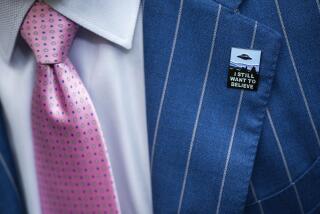Claims Colleagues ‘Papered Over’ Consciences : CIA Specialist Backs CBS at Trial
- Share via
NEW YORK — In a choked voice and seemingly on the verge of tears, a 31-year veteran of the Central Intelligence Agency told a federal jury Wednesday that many of his colleagues “had papered over their conscience” during a 1967 dispute with the U.S. Military Command in Saigon over the number of enemy troops involved in the Vietnam War.
The remark came from Richard Kovar, a Vietnam specialist for the CIA through much of the war, who appeared in court as a defense witness for CBS as Gen. William C. Westmoreland’s $120-million libel trial against the network neared the end of its 16th week.
His testimony in defense of former CIA analyst Sam Adams marked one of the more dramatic moments of the long courtroom struggle.
“A lot of people at CIA I knew had papered over their conscience,” Kovar said, “I myself didn’t feel very good about it . . . I encouraged Sam to go out and dig out the real story.”
Consultant for Program
Adams, who quit the CIA in 1973, provided much of the research for the CBS documentary, “The Uncounted Enemy: A Vietnam Deception.” The program, on which Adams served as a paid consultant, charged that Westmoreland misled the President and the nation’s policy-makers by underestimating the number of enemy troops at the height of the war.
The actions in dispute took place throughout 1967, the period leading up to the 1968 Tet offensive. Today is the 17th anniversary of the massive enemy assault.
Though the North Vietnamese and Viet Cong attack turned into a major victory for the U.S. and South Vietnamese forces, it gave rise to new waves of war opposition at home.
CBS contends that the psychological and political reaction was magnified because Westmoreland and his command had misled the country on the size of the enemy force.
CIA Analysts Called
In recent days several CIA analysts have been called by CBS to support Adams’ thesis that enemy numbers were whittled down to keep them under a ceiling imposed by Westmoreland.
Kovar, who for the last four years was assigned to write the daily intelligence reports sent to President Reagan, dramatically supported Adams as he neared the end of his testimony Wednesday. “I’ve heard Sam criticized by people still in the agency,” Kovar said. “What Sam did wrong . . . he didn’t salute and shut up, he pushed his argument and his outrage at the agency’s acquiescence in this . . .”
Kovar followed several other CIA witnesses who complained that the CIA capitulated to Westmoreland’s command in the fight over the enemy troop count to be put in a special national intelligence estimate that was to be used by the President and top policy-makers.
He told the jury Wednesday he had never seen an estimate prepared the way the 1967 document was put together.
The Vietnam command, Kovar said, “had been invited to contribute and instead had imposed its will, its command power.”
U.S. District Judge Pierre N. Leval, who is trying the case, seemed surprised when Westmoreland’s attorneys did not object to Kovar’s staunch defense of Adams, which had seemed to stray far from the question he’d been asked.
After the jury left the room, he noted that since the jury had already heard the remarks, it would serve little purpose to order them stricken from the court records, but he said he would consider efforts to see that the remarks were not repeated.
Kovar’s testimony came after Ronald Smith, who became Adams’ boss immediately after the Tet offensive, testified that the CIA had made renewed efforts to get Westmoreland’s command to accept more realistic enemy estimates in 1968.
Must Show Malice
In order to prove he was libeled by the program, Westmoreland must show that the CBS charges were made with malice and reckless disregard for the truth.
This has caused much of the questioning to center on what Adams was told when he was conducting his research. Smith testified Wednesday that he had told Adams the troop estimates pushed through by the Vietnam command had not only seriously underestimated enemy strength but had also “misrepresented the nature of the war we were fighting.”
He said he had told Adams “I felt there was a massive sentiment to distort these numbers to Washington policy-makers (and) that would have been impossible without the leadership of Gen. Westmoreland.”
Earlier in his testimony Smith said he had told Adams the CIA’s capitulation to the Vietnam commands enemy count was “morally unacceptable.”
More to Read
Sign up for Essential California
The most important California stories and recommendations in your inbox every morning.
You may occasionally receive promotional content from the Los Angeles Times.













